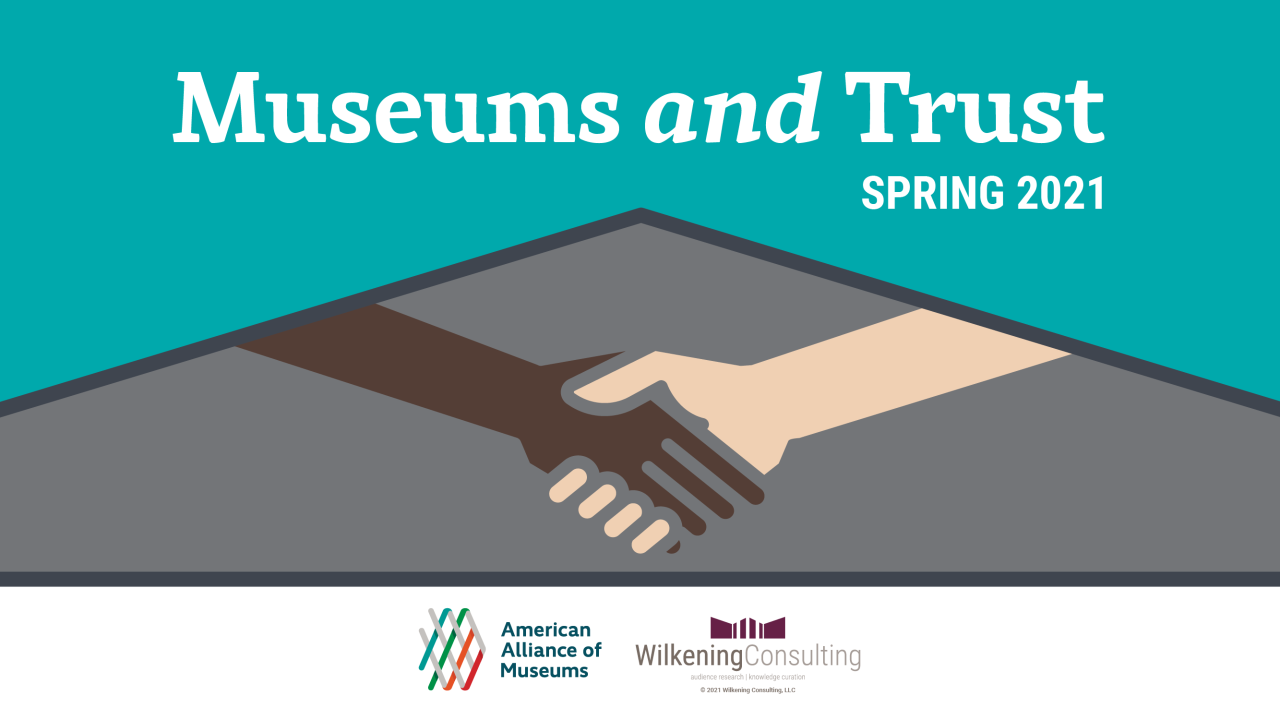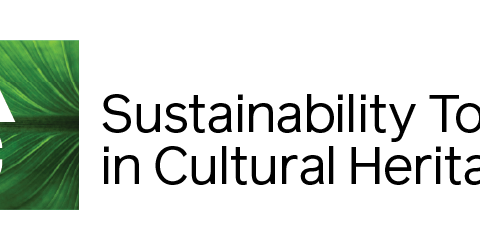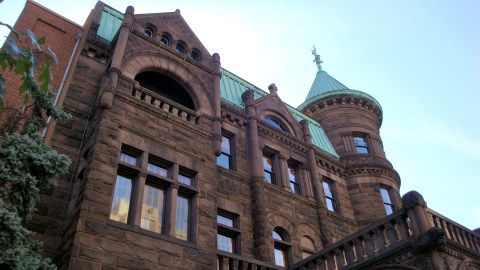
Museums consistently rank among the most trusted institutions in the US. Research commissioned by AAM in 2001 found almost 9 out of 10 Americans find museums to be trustworthy—and no other institution rated a similar level of trust. Subsequent research, including reports issued by the Institute of Museum and Library Services (2008), Reach Advisors (2015), IMPACTS Research (2017), Wilkening Consulting (2018), and IMPACTS Research (2020) tracked sustained high levels of public trust in museums throughout the beginning of the 21st century. To test whether that trust has endured the challenges of the past two years, the American Alliance of Museums worked with Wilkening Consulting to ask the American public whether and why they trust US museums. The main results are summarized in the new report Museums and Trust 2021.
The survey went out in May 2021, collecting over 1,200 responses from a group that is a close demographic match to the adult US population by age, educational attainment, race, and ethnicity.
The core of the survey invited respondents to rank their trust in museums as well as a range of other institutions (including the US government, nonprofits/NGOs generally, news outlets, corporations, and business), as well as their trust in specific types of museums from art museums to zoos. To dig deeper into how trust may vary across different segments of the public, the survey also collected information on demographics (race and ethnicity, age, gender, educational attainment) as well as respondents’ museum-going behaviors and political values. This research also explored why people trust museums, and what they expect of museums in terms of how they do and should present information to the public.
Highlights
Museums and Trust 2021 confirms that the public continues to regard museums as highly trustworthy—ranking second only to friends and family, and significantly more trustworthy than researchers and scientists, NGOs generally, various news organizations, the government, corporations and business, and social media. For respondents who had visited a museum in the past two years (one-quarter of respondents), museums are the number one trusted source of information. This high level of trust is consistent for museums of all types, from art museums to zoos. The top three reasons cited as contributing to this trust are that museums are fact-based, present real/authentic/original objects, and are research-oriented.
The demographics of trust
The report examined trust through the lenses of race and ethnicity, political affiliation, and attitudes towards inclusion. A few highlights from these analyses: People from households that are made up solely of people who identify as white are significantly more trusting of museums than people from households comprised of people of color. Respondents across the political spectrum have high trust in museums, although those who self-identified as liberal have slightly higher levels of trust than those who identify as conservative or moderate. Generally, people who express inclusive attitudes are significantly more trusting of museums than people who express anti-inclusive attitudes or are ambivalent about inclusion. That said, the general pattern of museums being highly trusted holds true across all segments of race and ethnicity, political beliefs, and attitudes towards inclusion.
Nonpartisan trust
This report confirms that museums enjoy robust, nonpartisan support. Museum trust levels are high overall for people who identify as conservative, moderate, and liberal. Museums tie with “friends and family” for #1 among moderates. They rank #2 to “friends and family” for conservatives, and #2 to “researchers and/or scientists” for liberals. And museum-goers (people who indicated they had visited a museum in the past two years) are evenly distributed across the political spectrum.
Influencing public attitudes and behavior
The Museums and Trust 2021 survey asked respondents a variety of questions on the role of museums in taking positions on important issues. In the process, it probed public attitudes towards “neutrality,” a term that has been used by public participants in other research. (AAM acknowledges that the public interpretation of the term is in tension with the growing awareness in the museum profession that museums are not neutral but rather inherently present a specific point of view (Murawski, 2017; Rodriguez, 2017; Sentence, 2018; Autry and Murawski, 2019).)
Over a third (35 percent) of respondents indicated that one reason contributing to their trust in museums is that museums are “nonpartisan/neutral,” and 27 percent believe it is never appropriate for museums to suggest or recommend behaviors or actions to the public. Museum-goers are more likely to think museums have a point of view, but just as likely as non-visitors to think museums “should” always be neutral. People who think museums are neutral express higher levels of trust (in organizations overall, and in museums specifically) and are two times more likely to consider museums to be credible sources of information than people who believe museums have a specific agenda. This information can inform how museums craft their dialogue with the public around the positions they take, and the impact they want to have on the world.
As noted in Audiences and Inclusion: A Primer for Cultivating More Inclusive Attitudes Among the Public, (Wilkening Consulting and AAM, 2021), museums need to cultivate a deeper understanding of the values and attitudes audiences express towards museums and the idea of neutrality. That understanding will enable them to pace their work to the “speed of trust” in order to be effective forums for civil discourse. The fact that museums are trusted means they have the potential to influence opinions and attitudes, to the extent that they are also skilled communicators.








